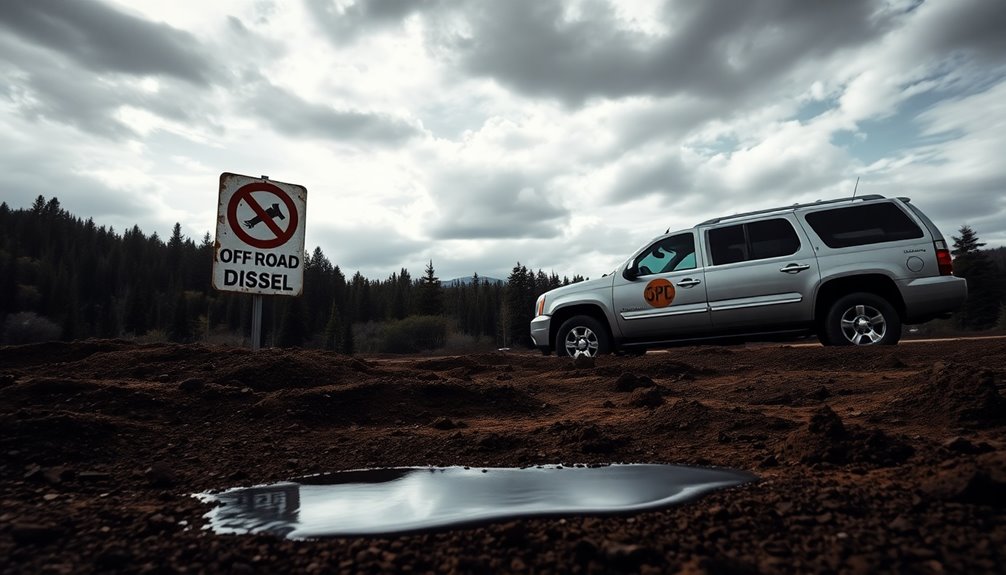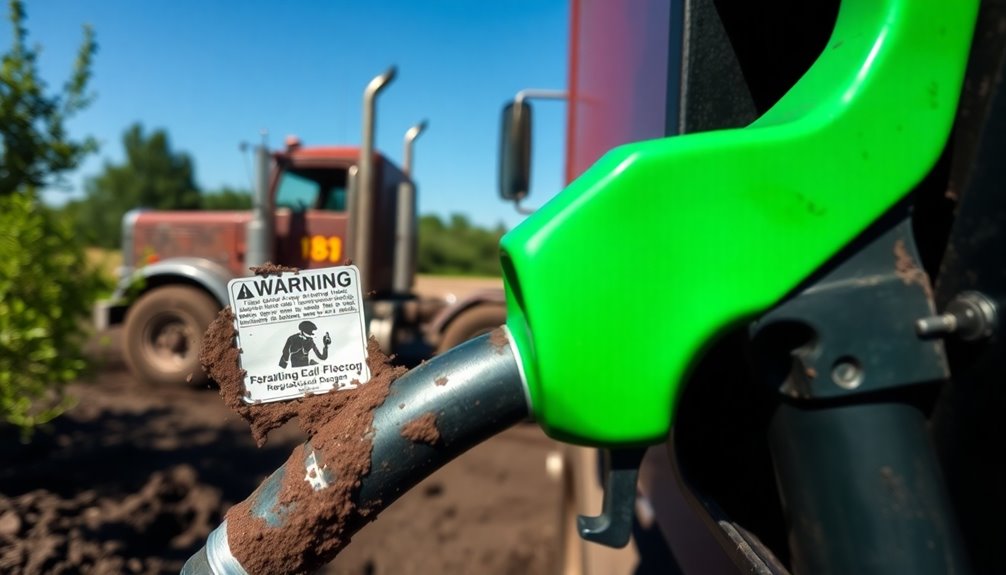Using off-road diesel in on-road vehicles is illegal because it evades taxes intended for highway use. This red-dyed fuel is meant for non-highway applications like farming and construction and is exempt from federal and state diesel taxes. Since it's not taxed, using it on highways constitutes a violation of tax laws. The IRS actively enforces compliance, and penalties for illegal usage can reach up to $10 per gallon. Additionally, repeat offenders face stricter scrutiny from authorities. Understanding the regulations around off-road diesel can help you avoid costly mistakes and fines. Stick around to learn more about its legal uses and penalties.
Key Takeaways
- Off-road diesel is illegal for use in on-road vehicles as it constitutes tax evasion due to its untaxed status.
- The fuel is dyed red to indicate its tax-exempt status and compliance with regulations for non-highway use only.
- Penalties for illegal use can reach up to $10 per gallon or $1,000 per violation, imposing significant financial risks.
- The IRS strictly enforces regulations and conducts inspections to identify illegal usage of off-road diesel.
- Back taxes may be imposed, leading to additional financial burdens for individuals or businesses caught misusing the fuel.
Definition of Off-Road Diesel

Off-road diesel, often referred to as red-dyed diesel, is a specific type of fuel designed for non-highway vehicles and equipment like tractors and construction machinery. This untaxed fuel is primarily used in industries such as agriculture and construction, where heavy machinery operates off public roads.
The distinctive red dye in off-road diesel acts as an identifier, signaling that no federal or state highway taxes have been paid on it, unlike on-road diesel, which is subject to these taxes.
Using off-road diesel in on-road vehicles is illegal and can result in significant penalties. This misuse constitutes tax evasion, as off-road diesel is meant solely for legal use in non-highway applications.
The formulation of off-road diesel meets specific quality specifications, often containing less than 15 parts per million (ppm) sulfur, making it compatible with modern diesel engines found in heavy equipment.
It's essential to understand the regulations surrounding off-road diesel, as improper use can lead to serious legal consequences. By adhering to the guidelines, you guarantee that you're using the right type of diesel fuels for your equipment while staying compliant with tax laws.
Tax Implications and Regulations

Using off-road diesel comes with specific tax implications and regulations that you need to be aware of. This dyed diesel is meant for non-highway vehicles, making its illegal use in on-road vehicles a serious issue. The federal government imposes a highway tax of 24.4 cents per gallon on regular diesel, but off-road diesel avoids these fuel taxes, resulting in significant savings for construction equipment and agricultural users. However, misusing dyed diesel on public roads can lead to tax evasion penalties, with fines potentially reaching $10 per gallon or $1,000 per violation.
Here's a breakdown of some key tax implications:
| Aspect | Off-Road Diesel | On-Road Diesel |
|---|---|---|
| Federal Tax | Exempt | 24.4 cents per gallon |
| State Tax | Varies by state | Generally applicable |
| Compliance Requirement | Strict enforcement | Standard regulations |
| Penalties for Illegal Use | Up to $10/gallon | $1,000 per violation |
| Intended Use | Non-highway vehicles | Highway vehicles |
Understanding these regulations is essential to avoid penalties and guarantee compliance with tax laws.
Enforcement Mechanisms for Compliance

Frequently, the U.S. government employs a range of enforcement mechanisms to secure compliance with off-road diesel regulations. The IRS manages a dye detection program, where red dye signifies tax-exempt fuel intended solely for off-road use. Inspectors can check fuel samples in vehicles at safety check stations, weigh stations, and during agricultural shows to confirm you're adhering to these regulations.
If you're caught using dyed diesel illegally, be prepared for serious penalties. Fines can reach up to $10 per gallon or $1,000 per violation, whichever is higher, making it vital to comply. Detection methods include field packs that test for dye presence, allowing federal oversight to effectively identify violations.
With enforcement mechanisms in place, the government actively safeguards against misuse of off-road diesel. All states, except Alaska, enforce these regulations, though Alaska has unique rules that may provide exemptions for certain off-road diesel usage.
Staying informed about these regulations and the potential for penalties can help you avoid costly mistakes and secure compliance with off-road diesel laws.
Legal Uses of Dyed Diesel

Dyed diesel, often referred to as off-road diesel, serves specific legal purposes that align with regulatory guidelines. You can legally use dyed diesel in non-highway vehicles and equipment, such as tractors and construction machinery. This fuel is tax-exempt, making it a cost-effective choice for industries that rely heavily on heavy machinery.
Agricultural machinery can utilize off-road diesel within a 25-mile radius of its registered address, guaranteeing compliance with the regulations set forth by governing bodies. Additionally, public school districts and government agencies may obtain special licenses to use dyed diesel in on-road applications, provided they meet specific conditions.
During declared states of emergency, the use of dyed diesel on public roads may be permitted to facilitate recovery efforts and provide essential services to the community.
It's important to recognize that proper labeling is required at pumps dispensing dyed fuel, clearly marking its tax-exempt status for non-taxable use only. By adhering to these legal uses and guidelines, you can guarantee that your operations remain compliant while benefiting from the advantages of dyed diesel.
Consequences of Illegal Usage

The illegal use of off-road diesel in on-road vehicles carries serious consequences that can impact both individuals and businesses. When you choose to use dyed diesel, often referred to as red fuel, in violation of regulations, you expose yourself to significant risks.
Here are some potential consequences you might face:
- Fines: You could incur fines ranging from $100 to over $1,000 per gallon of illegal fuel.
- Back Taxes: The IRS and state tax authorities may require you to pay back taxes, leading to a hefty financial burden.
- Employment Risks: Being caught could jeopardize your job, leading to disciplinary actions or even termination.
- Increased Scrutiny: Repeat offenses often invite more frequent inspections and harsher penalties from tax authorities.
- Government Enforcement: Fuel testing at safety check stations can reveal the presence of dyed diesel, resulting in enforcement actions.
Understanding these consequences is vital. The penalties for using off-road diesel illegally go beyond just financial repercussions; they can affect your livelihood and reputation.
It's important to comply with regulations to avoid these serious ramifications.
Frequently Asked Questions
Why Can't You Use Off-Road Diesel?
You can't use off-road diesel because it's intended for specific machinery, like tractors and construction equipment, that operates off public roads.
If you tried to use it in your vehicle, you'd risk facing hefty fines and penalties. Authorities monitor fuel for red dye, which marks it as off-road diesel.
Why Is Red Diesel Illegal on Roads?
Some might think red diesel's just another fuel option for your vehicle, but it's illegal on public roads for good reason.
Using it allows you to dodge taxes meant for road upkeep, creating an unfair advantage. Authorities strictly monitor this, and if you're caught, you could face hefty fines or even jail time.
Why Is Red Diesel Not Taxed?
Red diesel isn't taxed because it's intended for non-road applications like farming and construction.
By keeping it tax-exempt, you're able to reduce operational costs for equipment that doesn't impact public road maintenance. This helps industries that rely heavily on machinery to operate more efficiently.
If red diesel were taxed, it could increase expenses for you and your business, making it harder to compete in the market.
Why Can't Truckers Use Red Dye Diesel?
You can't use red dye diesel because it's meant solely for off-road vehicles and machinery.
Using it in your truck on public roads is considered tax evasion, as this fuel isn't subject to highway taxes that support road maintenance.
If you're caught, the IRS imposes hefty fines, and the presence of the dye can be detected through testing.
Conclusion
In conclusion, using off-road diesel illegally can lead to hefty penalties and problematic repercussions. The law's laborious limitations on dyed diesel are designed to deter deceitful drivers and guarantee fair fuel usage. By sticking to the rules and respecting regulations, you can steer clear of serious sanctions and support sustainable practices. So, stay savvy and safe on your travels, and remember: compliance creates a cleaner, calmer community for everyone involved!









